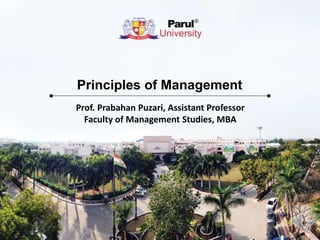
POM Module 1.pptx
- 1. Principles of Management Prof. Prabahan Puzari, Assistant Professor Faculty of Management Studies, MBA
- 2. WELCOME ALL OF YOU. BE VIBRANT
- 3. What is Management ? Management can be defined as the process of achieving organizational goals through planning, organizing, leading, and controlling the human, physical, financial, and information resources of the organization in an effective and efficient manner.
- 4. Organization and Need for Management It arranges the factors of production, assembles and organizes the resources, integrates the resources in effective manner to achieve goals. It directs group efforts towards achievement of pre-determined goals. IMPORTANCE OF MANAGEMENT Helps to achieve goals and objectives. For optimum utilization of resources. To maintain responsibility and order. To get the most qualified personnel for the job. To reduce workload and get things done. Helps facilitate good communication.
- 5. Management Process Systems are classified in different ways: Planning. Organizing. Staffing. Directing. Controlling. Image source : youtube
- 6. Organization Management Organization management refers to the art of getting people together on a common platform to make them work towards a common predefined goal. Organization management enables the optimum use of resources through meticulous planning and control at the workplace. Organization management gives a sense of direction to the employees. The individuals are well aware of their roles and responsibilities and know what they are supposed to do in the organization. An effective management ensures profitability for the organization. In a layman’s language organization management refers to efficient handling of the organization as well as its employees.
- 7. Need for Organization Management Organization management gives a sense of security and oneness to the employees. An effective management is required for better coordination among various departments. Employees accomplish tasks within the stipulated time frame as a result of effective organization management. Employees stay loyal towards their job and do not treat work as a burden. Effective organization management leads to a peaceful and positive ambience at the workplace.
- 8. Management as Science or Arts Managing is the “art of arts” because it organizes and uses human talent Elements of art in management Practical Knowledge Personal Skill Creativity Perfection through practice Goal-Oriented Elements of Science in Managing Concepts Methods and principles Theories Organized knowledge Practice
- 9. EVOLUTION OF MANAGEMENT Management thought is regarded as an evolutionary concept. It has developed along with it and in line with social, cultural, economic and scientific institutions. Management thought has its origin in ancient times. It is developed along with other socio economic development.
- 10. Skills of Manager Technical skills Human skills Conceptual skills Design skills 9 Skills Needed to Become effective Manager
- 11. Business Ethics Ethics is a set of principles or standards of human conduct that govern the behavior of individuals or organizations. Using these ethical standards, a person or a group of persons or an organization regulate their behavior to distinguish between what is right and what is wrong as perceived by others
- 12. Characteristics of Business Ethics Business ethics are based on social values, as the generally accepted norms of good or bad and ‘right’ and ‘wrong’ practices. It is based on the social customs, traditions, standards, and attributes. Business ethics may determine the ways and means for better and optimum business performance. Business ethics provide basic guidelines and parameters towards most appropriate perfections in business scenario. Business ethics is concerned basically the study of human behavior and conducts. Business ethics is a philosophy to determine the standards and norms to make mutual interactions and behavior between individual and group in organization. Business ethics offers to establish the norms and directional approaches for making an appropriate code of conducts in business. It is based on the concepts, thoughts and standards as generated by Indian ethos.
- 13. Characteristics of Business Ethics Business ethics may be an ‘Art’ as well as ‘Science’ also. Business ethics basically inspire the values, standards and norms of professionalism in business for the well-being of customers. Business ethics is to motivate and is consistently related with the concept of service motives for the customers’ view point. Business ethics shows the better and perspective ways and means for most excellences in customization. Business ethics aims to emphasize more on social responsibility of business towards society.
- 14. Tools Business Ethics Top Management Commitment Ethics Committees Ethics Audits Ethics Training Ethics Hotline Codes of Ethics Codes of Conduct Policies and Procedures